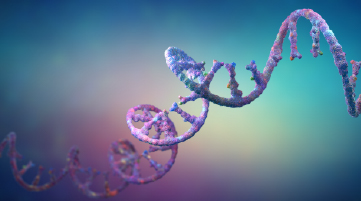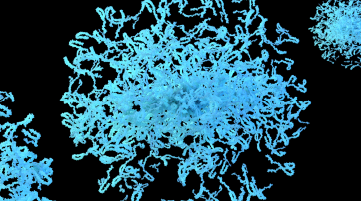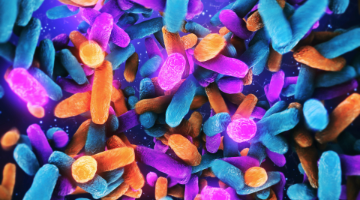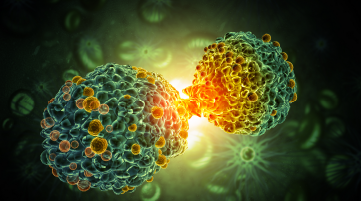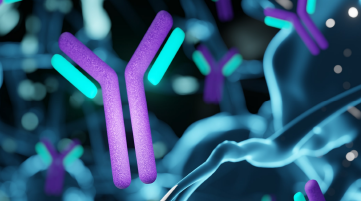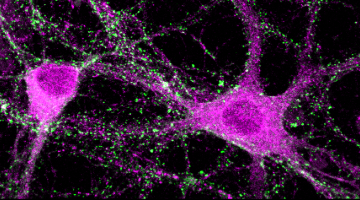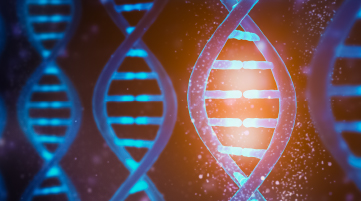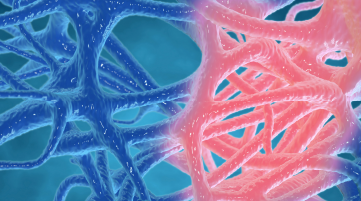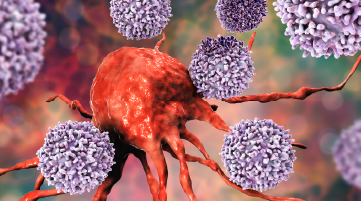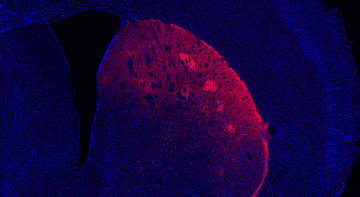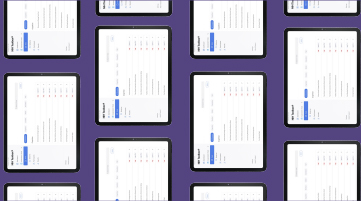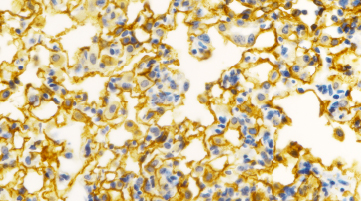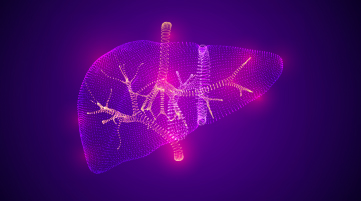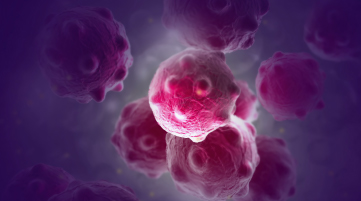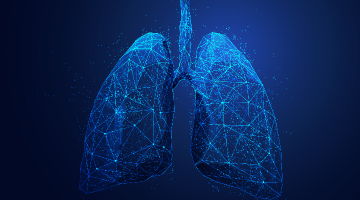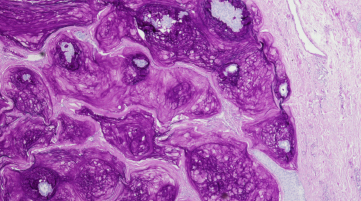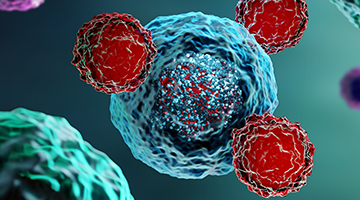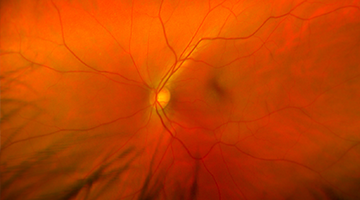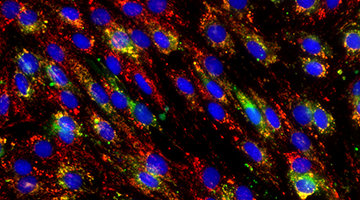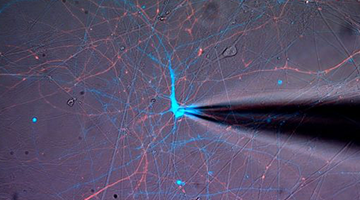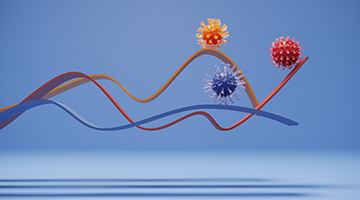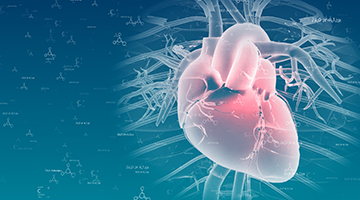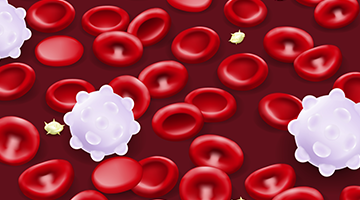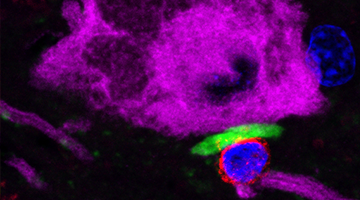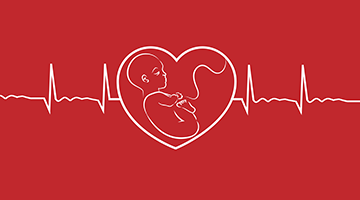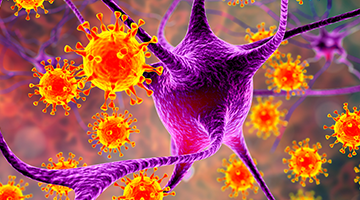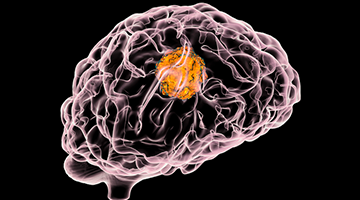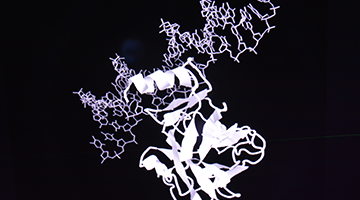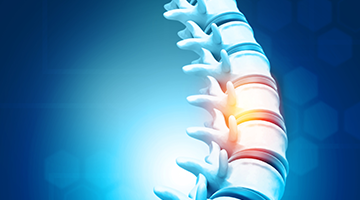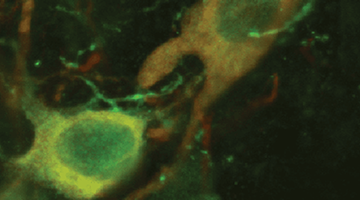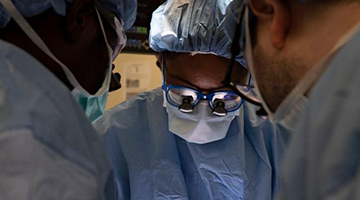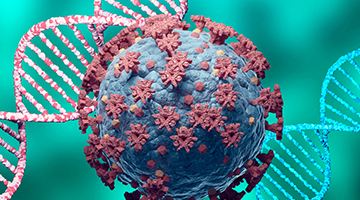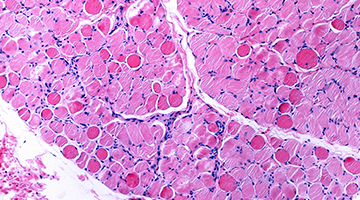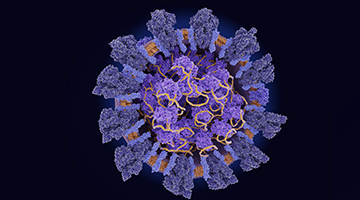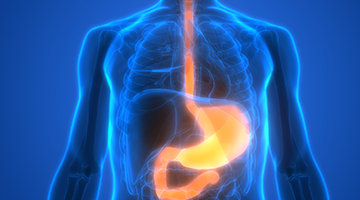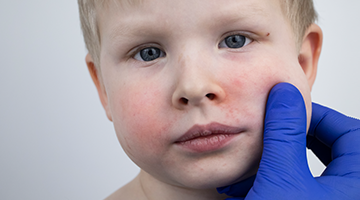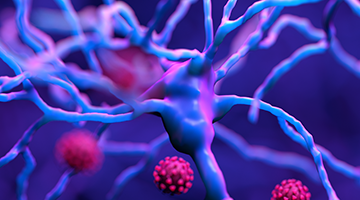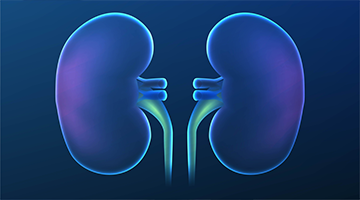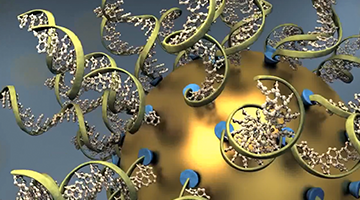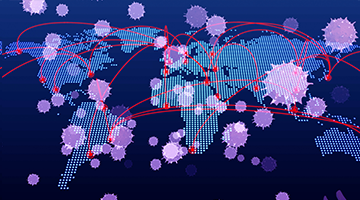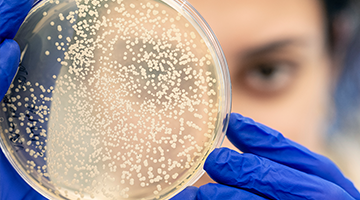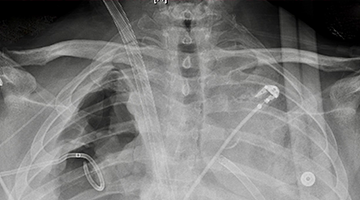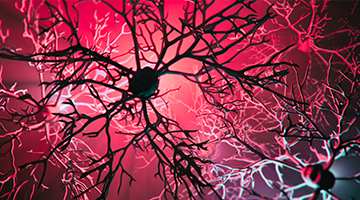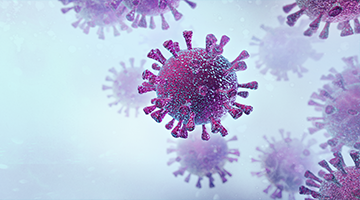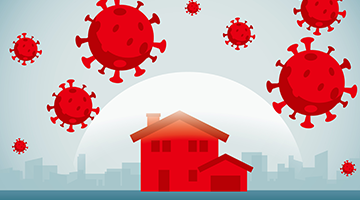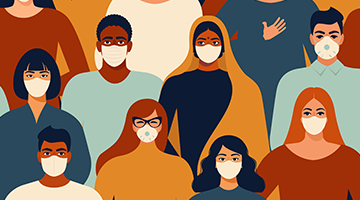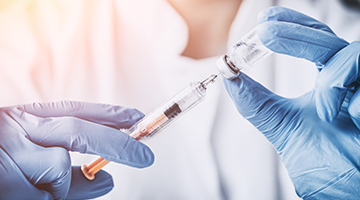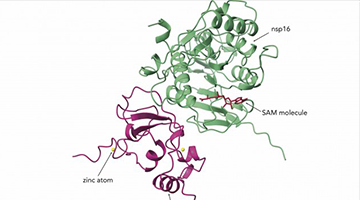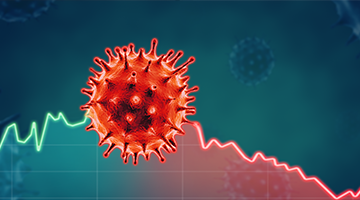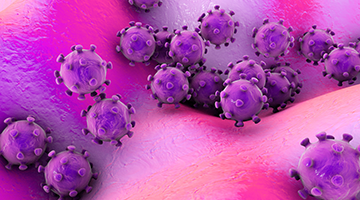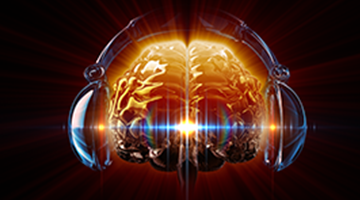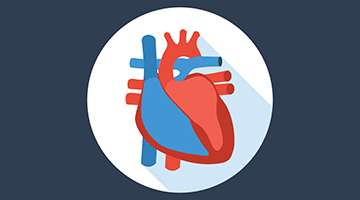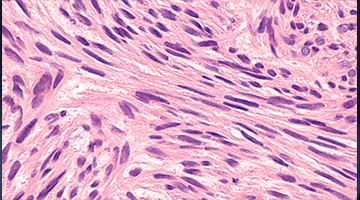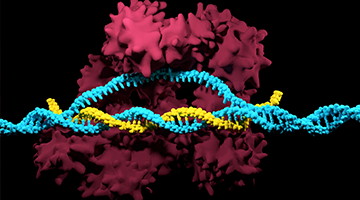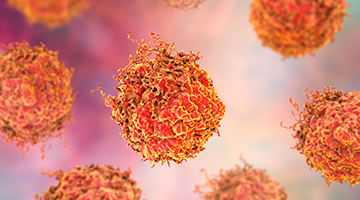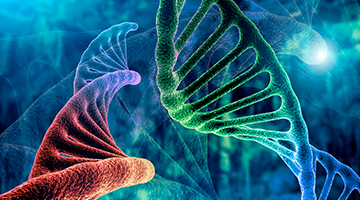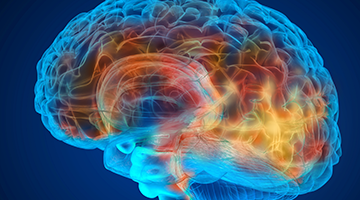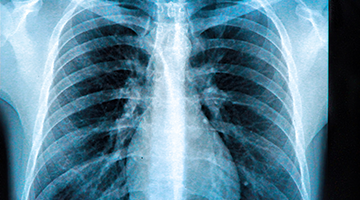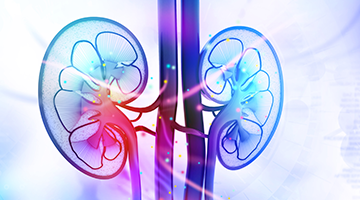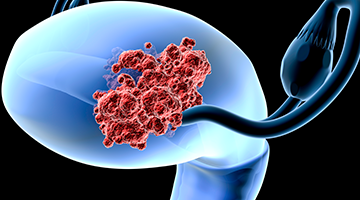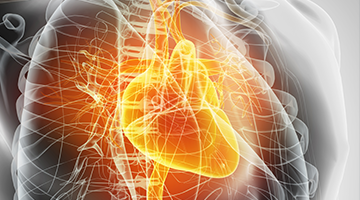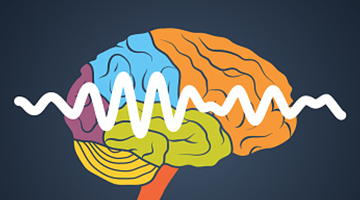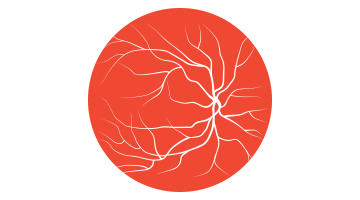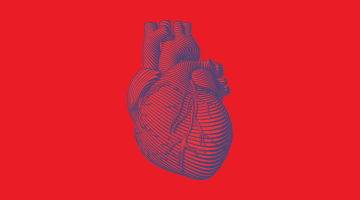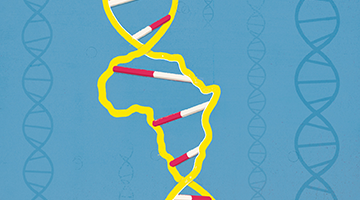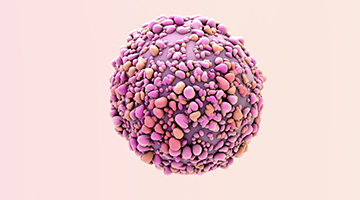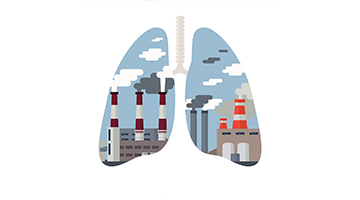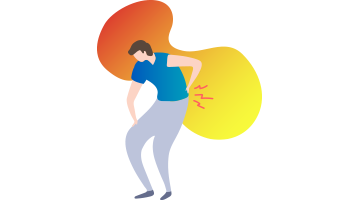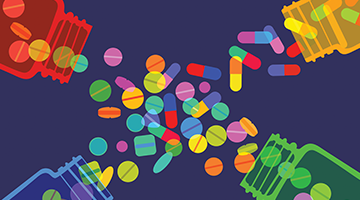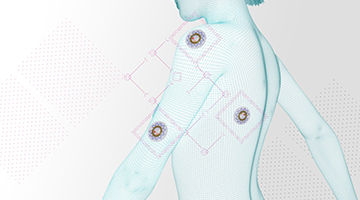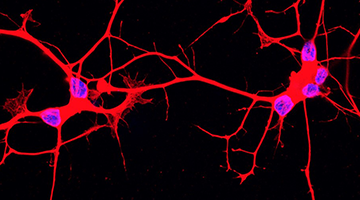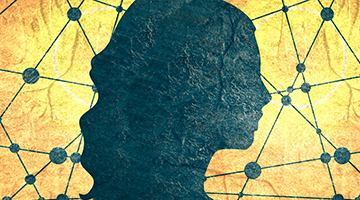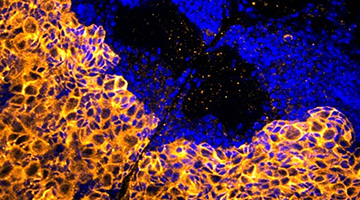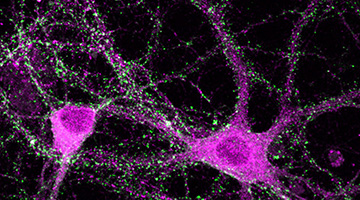Breakthroughs Podcast Archive
Listen to the people behind the science.
Northwestern University Feinberg School of Medicine is a research-intensive medical school that fosters powerful collaborations on a thriving academic medical campus. We are driven by our mission to transform the practice of medicine and profoundly impact human health beyond the individual patient. We believe better answers only come from discovery.
| Episodes | Release Date |
|---|---|
Pursuing Precision Medicine for Rare Diseases with Gemma Carvill, PhDScientists from Northwestern Medicine, the Broad Institute of MIT and Harvard have uncovered the first rare genetic disorder linked to a long non-coding RNA gene. In this episode, Gemma Carvill, PhD, explains how this discovery, published in The New England Journal of Medicine, came to be and the critical roles non-coding regions of the genome may have in human health. | Feb 3, 2025 |
Investigating the Health Impact of Incarceration with Linda Teplin, PhDWith a new $20 million grant from the National Institute on Aging, Northwestern investigator, Linda Teplin, PhD, is extending the work of the Northwestern Juvenile Project to study the long-term consequences of incarceration on age-related conditions, including Alzheimer's and other age-related diseases. This project is the only large-scale longitudinal study of its kind tracking health and outcomes of detained juveniles in the years following their release. | Dec 9, 2024 |
Studying Social Networks to Address Health Inequities with Michelle Birkett, PhDUnderstanding the systemic drivers of health disparities within marginalized populations is complex. In this episode, Michelle Birkett, PhD, explains how she uses network and quantitative methodologies to study the health of marginalized populations, particularly sexual and gender minority youth. She also discusses her new center, the Center for Computational and Social Sciences in Health, and the importance of transdisciplinary research. | Nov 21, 2024 |
Emerging Drug Targets in Parkinson's Disease with Joe Mazzulli, PhDNearly one million people in the U.S. are living with Parkinson's disease, a condition for which there is still no known cause or cure. Joseph Mazzulli, PhD, has led two recent studies published in Neuron and Nature Communications uncovering previously unknown cellular mechanisms driving the disease. These studies highlight the potential for new therapeutic targets, including restoring neuronal function for patients with Parkinson's and other neurodegenerative diseases. | Nov 4, 2024 |
New Insights into Cellular Metabolism with Issam Ben-Sahra, PhDNew research from the lab of Issam Ben-Sahra, PhD, could rewrite textbooks on our understanding of cellular metabolism and potentially identify new targets for cancer and metabolic diseases such as obesity. The discovery, published in the journal Science, has been praised for its rigorous simplicity and underscores the importance of understanding the molecular mechanisms that underlie specific biological processes. | Oct 21, 2024 |
Understanding Gut Microbiome Science with Jeffrey Gordon, MDJeffrey Gordon, MD, often called “the father of microbiome research,” is the 2024 recipient of the Mechthild Esser Nemmers Prize in Medical Science. In this episode, Gordon discusses the impacts of his long career in gut microbiome research, which has profoundly transformed our understanding of human health. Specifically, he shares the evolution of groundbreaking approaches to treating malnutrition and childhood undernutrition with microbiota-targeted therapies. | Oct 7, 2024 |
Overcoming Hormone Therapy Resistance in Prostate Cancer with Sarki Abdulkadir, MD, PhDThe MYC oncogene is notorious in the cancer research world because it is implicated in many advanced or aggressive cancers such as treatment-resistant prostate cancer. In this episode, Sarki Abdulkadir, MD, PhD, shares how his team bucked the conventional notion that the MYC gene is “undruggable” and uncovered a handful of compounds that block MYC gene activity, making prostate cancer tumors sensitive to hormone therapy and opening up a potential new therapeutic target for treatment-resistant prostate cancer. | Sep 16, 2024 |
How to Measure Biological Age with John Wilkins, MDA team of Northwestern Medicine scientists are conducting a new longitudinal cross-sectional study to investigate why some people see to age faster than others. In this episode, John Wilkins, MD, associate director of the Human Longevity Laboratory at the Potocsnak Longevity Institute, shares details of the study, which will eventually include a variety of interventions aimed at slowing down the aging process. | Jul 22, 2024 |
A Compelling New Lupus Discovery with Jaehyuk Choi, MD, PhDNorthwestern Medicine physician-scientist Jaehyuk Choi, MD, PhD joins the show again to discuss another breakthrough. This time for lupus, a chronic autoimmune condition affecting 300,000 Americans that can cause inflammation in many body parts, including joints, skin, kidneys, blood cells, brain, heart and lungs. Findings by Choi and his lab members not only elucidate the underlying mechanisms of lupus but also suggest potential therapeutic strategies. | Jul 10, 2024 |
Uncovering Insights into Cancer and Alzheimer's with Marcus Peter, PhDFor decades, Marcus Peter, PhD, has drilled into an area of research focused on cell death and the roles of toxic and protective short RNAs, with the goal of developing a novel form of cancer treatment. Now, this same line of research has led Peter’s team to uncover new insights into the cause of Alzheimer's disease. In this episode, Peter explains his pioneering work in investigating RNA interference in diseases and explains how his lab’s latest novel discovery may have relevance to an array of neurodegenerative diseases beyond Alzheimer’s. | May 20, 2024 |
The Evolution of Digital Pathology with Lee Cooper, PhDNew advances in digital pathology are revolutionizing the analysis of disease, paving the way for greater accuracy and efficiency when it comes to diagnostics, predicting outcomes and treatment. In this episode, Lee Cooper, PhD, discusses the future of digital and computational pathology and his research on machine learning and pathology, including a recent study published in Nature Medicine on using AI in predicting clinical outcomes for breast cancer patients. | May 6, 2024 |
Driving Innovations in Biostatistics with Denise Scholtens, PhDNorthwestern University Feinberg School of Medicine is home to a team of premier faculty and staff biostatisticians who are a driving force of data analytic innovation and excellence. In this episode, Denise Scholtens, PhD, a leader in biostatistics at Feinberg, discusses the growing importance of the field of biostatistics and how she leverages her skills to collaborate on several projects in Maternal and Fetal Health. | Apr 22, 2024 |
Leading Pediatric Obesity Research with Justin Ryder, PhDNorthwestern Medicine scientists are at the forefront of research investigating the most effective ways of treating obesity in children and teens and improving their access to care. In this episode, Justin Ryder, PhD, a clinical and translational obesity scientist at Feinberg, talks about the use of new GLP-1–based medications for childhood obesity and his work on several NIH-funded projects focused on understanding how pediatric obesity impacts chronic disease risk and how biology drives weight regain. | Apr 5, 2024 |
Discovering New ALS Therapeutic Avenues with Evangelos Kiskinis, PhDAn estimated 32,000 Americans are currently living with ALS, or amyotrophic lateral sclerosis, a progressive neurodegenerative disease that attacks motor neurons in the brain and spinal cord. Northwestern investigators have uncovered novel cellular mechanisms involved in two types of genetic ALS that might lead to future targeted therapies. Evangelos Kiskinis, PhD, shares insights on these findings recently published in Science Advances and Cell Reports. | Mar 25, 2024 |
Pursuing Deeper Understanding of Inflammation with Murali Prakriya, PhDInflammation is a common feature of many diseases and Northwestern Medicine investigators have identified how a calcium channel contributes to inflammation in the brain and lungs. This could aid in finding new types of therapeutics for inflammation-related diseases and conditions. In this episode, Murali Prakriya, PhD, discusses the evolution of this groundbreaking research in ion channels as well as his latest findings published in Nature Communications. | Mar 11, 2024 |
Partnering with Libraries to Address Teen Mental Health with Ashley Knapp, PhD, and Robert Simmons, MATeens are reporting struggles with their mental health at unprecedented rates, but resources to help these young people deal with anxiety or depression can be difficult to access. In this episode, Ashley Knapp, PhD, assistant professor of Psychiatry and Behavioral Sciences, and Robert Simmons, MA, director of social services and public safety at Oak Park Public Library, discuss an innovative community partnership between Northwestern Medicine investigators and a Chicagoland library and how it could be a model for future health interventions. | Feb 26, 2024 |
Engineering Bacteria to Monitor and Treat Disease with Arthur Prindle, PhDThanks to advancements in synthetic biology, scientists are now engineering bacterial communities with the goal of using these cells to monitor and treat diseases. In this episode, Arthur Prindle, PhD, explains how his lab is reprogramming bacteria that may be used in the future to detect disease and deliver therapeutics for many different conditions, including cancer, diabetes and inflammatory bowel disease. | Feb 12, 2024 |
Strengthening T-Cell Therapy for Solid Tumor Cancers with Jaehyuk Choi, MD, PhDA new study published in the journal Nature details breakthrough T-cell immunotherapy research from Northwestern Medicine. In this episode, Jaehyuk Choi, MD, PhD, senior author of the paper, explains how a gene mutation found in T-cells of patients with lymphoma could hold the key to a potent cancer-fighting immunotherapy for solid tumor cancers, which account for 90 percent of all cancers. | Feb 7, 2024 |
New Insights into Dopamine with Raj Awatramani, PhD, and Daniel Dombeck, PhDWhen most of us think about dopamine, we think about reward signals. But new research from Northwestern Medicine, published in Nature Neuroscience, has found a genetic subtype of dopamine neurons that do not respond to rewards at all, and instead, fire when the body moves. Rajeshwar Awatramani, PhD, and Daniel Dombeck, PhD led this work. In this episode they explain how the results could change the field of dopamine research | Dec 1, 2023 |
The Evolution of the NIH Toolbox with Richard Gershon, PhDAs the primary investigator of The NIH Toolbox®, Richard Gershon, PhD, has led a team of hundreds of scientists to develop and evolve state-of-the-art digital assessments of cognition, motor, sensation and emotion which has been used by clinicians, investigators and academics for nearly two decades. In this episode, Gershon explains how the third version of The NIH Toolbox® app developed for the iPad, provides test batteries for cognition, motor, emotional and sensory functioning. | Nov 13, 2023 |
How Mitochondria Inform Disease Discoveries with Navdeep Chandel, PhDMitochondria are widely known as cellular “powerhouses” for their role in producing energy for cells. But pioneering research from Northwestern Medicine investigators over the last 20 years has proven mitochondria are also major players in lung disease, cancer, brain disease and immune-related diseases. Navdeep Chandel, PhD, a 2023 recipient of the Lurie Prize in Biomedical Sciences by the Foundation for the National Institutes of Health, leads this research. In this episode he discusses how his team’s recent findings could advance the design and implementation of new therapies. | Oct 30, 2023 |
Advancing Transplant Science with Daniela Ladner, MD, MPHNorthwestern Medicine is dedicated to improving outcomes for patients who are in need of organ transplants. Daniela Ladner, MD, MPH, is leading research that sheds light on the barriers to transplantation as the founding director of the Northwestern University Transplant Outcomes Research Collaborative (NUTORC). She discusses the groundbreaking research that makes Northwestern a leader in organ transplantation. | Oct 16, 2023 |
How Drinking Alcohol Impacts Aging with Lifang Hou, MD, PhDBoth long-term alcohol consumption and binge drinking can speed up biological aging, according to a Northwestern Medicine study published in the journal Aging. Lifang Hou, MD, PhD, chief of Cancer Epidemiology and Prevention in the Department of Preventive Medicine led the study and discusses the link between genetics and lifestyle in the context of preventing disease. | Oct 2, 2023 |
How AI Can Improve Healthcare Delivery with Mozzi Etemadi, MD, PhDMozziyar “Mozzi” Etemadi, MD, PhD, is supporting the transformation of healthcare delivery and patient care at Northwestern Medicine by bringing engineers into direct contact with clinical providers. In this episode, he talks about the explosion of artificial intelligence in healthcare in recent years and how Northwestern Medicine is using this technology to improve healthcare delivery and patient care. | Sep 18, 2023 |
Predicting Which Cancer Cells May Become Drug-Resistant with Yogesh Goyal, PhDTreating cancer has become increasingly difficult as cells develop resistance. Northwestern investigators have sought to address this issue on the cellular level through the development of a novel FateMap tool, used to predict the future behavior of cancer cells before they are exposed to cancer-fighting drugs. In this episode, Yogesh Goyal, PhD, discusses his latest research, published in Nature, and how his lab is addressing complex problems through an interdiscplinary approach. | Jul 19, 2023 |
New Institute Advances Lung Disease Research and Clinical Care with Scott Budinger, MDThe launch of the Simpson Querrey Lung Institute for Translational Science (SQLIFTS) at Northwestern University Feinberg School of Medicine aims to expedite the discovery and implementation of innovative lung disease treatments through a patient-centered approach. In this episode, Scott Budinger, MD, the new executive director of the institute, discusses its launch and how it aims to transform lung disease research and clinical care.
| Jun 20, 2023 |
Understanding Genetic Factors in Parkinson's Disease with Steven Lubbe, PhDThe global prevalence of Parkinson's disease has doubled in the past 25 years. While research into this extremely diverse neurodegenerative disorder is very active, there is much left to be uncovered about the underlying cause of the disease. Recently, Northwestern Medicine investigators have discovered novel genetic factors contributing to the risk of Parkinson's disease, which may lead to potential therapeutic targets. Steven Lubbe, PhD, assistant professor of Neurology at Feinberg, discusses these findings recently published in the journal Brain. | Jun 5, 2023 |
Why Late-Night Eating is Linked to Weight Gain and Diabetes with Joseph Bass, MD, PhDDisrupting our internal clocks can lead to diseases such as obesity and diabetes. Scientists at Northwestern have uncovered the mechanism behind why late-night eating is linked to weight gain and diabetes. Joseph Bass, MD, PhD, led the study published in the journal Science. He shares the results and details the two decades of work leading to this latest discovery. Bass is chief of the Division of Endocrinology, Metabolism and Molecular Medicine in the Department of Medicine. | May 15, 2023 |
Improving Exercise Habits for Breast Cancer Survivors with Siobhan Phillips, PhD, MPHThere's strong evidence that physical activity can play an important role in the health and lifespan of cancer survivors. Siobhan Phillips, PhD, MPH, leads the Exercise and Health Lab at Feinberg, which designs, tests, implements and disseminates physical activity interventions to support cancer survivors. In this episode, Phillips details interventions specifically designed for breast cancer survivors, a majority of whom don't meet the recommended standards for weekly physical activity. | Apr 17, 2023 |
Advancing Skin Cell Biology with Kathleen Green, PhDSkin diseases from psoriasis to melanoma affect as many as one in three Americans at any given time. Kathleen Green, PhD, has greatly advanced basic molecular research related to skin diseases. She discusses recent discoveries in her lab that could lead to future therapeutic targets. | Apr 3, 2023 |
Can ChatGPT Support Biomedical Research? with Catherine Gao, MD and Yuan Luo, PhDNorthwestern scientists Yuan Luo, PhD, and Catherine Gao, MD, discuss a study they conducted using the artificial intelligence chatbot, ChatGPT. The results showcase the online tool's ability to produce convincing medical research abstracts. They also discuss the tool’s potential to help with writing-intensive tasks in healthcare and medical research. | Mar 6, 2023 |
How the Brain Regulates Aggressive Behavior with Ann Kennedy, PhDA theoretical neuroscientist, Ann Kennedy, PhD, is investigating neural computation and the structure of behavior. In this episode, she talks about her recent research in the area of aggression and how it's regulated in the brains of animals. She was recently named the winner of the 2022 Eppendorf and Science Prize for Neurobiology. | Feb 20, 2023 |
A New Focus on Implementation Science with Sara Becker, PhD, and Rinad Beidas, PhDTo have the greatest impact on human health, biomedical research findings and evidence-based practices need to be implemented into routine healthcare. What is implementation science, and how can we ensure research successfully makes an impact? Rinad Beidas, PhD, and Sara Becker, PhD, discuss the field and its future as a research priority at Northwestern University Feinberg School of Medicine. | Jan 23, 2023 |
The Science Behind Culinary Medicine with Melinda Ring, MDA Northwestern Medicine course called Cooking Up Health is giving medical students, trainees and health professionals the opportunity to learn culinary medicine and food-as-medicine science concepts. Melinda Ring, MD, created the course and explains how it can improve the health of patients and train more nutrition-aware physicians. | Dec 19, 2022 |
Identifying How Genes Function to Better Understand Cancer with Mazhar Adli, PhDUnderstanding how genes function is a vital part of understanding how to better treat cancer. Research led by Mazhar Adli, PhD, is grounded in the development of a systematic approach to identify the function of each gene in the human body. His team aims to discover novel therapeutic drug combinations to prevent cancer development and chemotherapy resistance. | Dec 5, 2022 |
The Long-term Impact of Bariatric Surgery in Adolescents with Thomas Inge, MD, PhDBariatric surgery is proving to be an effective tool to help teenagers with severe obesity lose weight and reverse the progression of weight-related conditions, according to findings from the Teen Longitudinal Assessment of Bariatric Surgery study (Teen-LABS). Thomas Inge, MD, PhD, principal investigator of Teen-LABS, shares results of the study, which is the only multicenter National Institute of Health sponsored research on adolescent bariatric surgery. | Nov 21, 2022 |
The Role of Dopamine in Habit Formation and Compulsive Behavior with Talia Lerner, PhDHow are habits – both good and bad – formed in the brain, and what role do habits play in diseases of the brain? These are some of the questions neuroscientist, Talia Lerner, PhD, is investigating in her lab. Her recent study, published in Cell Reports, may change the overall understanding of how habits are formed and could be broken. | Nov 1, 2022 |
Understanding the Immune System with Stephanie Eisenbarth, MD, PhDUniting scientists and harnessing the power of the immune system to fight disease is at the heart of the new Center for Human Immunobiology at Northwestern University Feinberg School of Medicine. Stephanie Eisenbarth, MD, PhD is leading the new center, she is also the new chief of Allergy and Immunology in the Department of Medicine. She discusses the variety of immunology research taking place within the new center and its goal of bringing a community of immunologists together to discover and translate innovative science into cures for immune-related diseases. | Oct 17, 2022 |
Improving Health Outcomes Through Big Data with Theresa Walunas, PhDIn recent years, Feinberg has launched several initiatives to augment human expertise with computational methods and advance the science of human health. Theresa Walunas, PhD, explains how she is using big data from electronic medical records in a variety of projects at Feinberg, from improving quality of care to identifying patients who could develop debilitating autoimmune diseases. | Oct 3, 2022 |
Identifying the Mechanisms of Seeing Color with Jeremy Nathans, MD, PhDA celebrated molecular neuroscientist, Jeremy Nathans, MD, PhD, is responsible for landmark discoveries that have changed our understanding of how humans see the world. He is an investigator of the Howard Hughes Medical Institute and professor at Johns Hopkins University School of Medicine. | Sep 19, 2022 |
The Role of Iron in Cardiovascular Disease with Hossein Ardehali, MD, PhDCardiovascular disease (CVD) is the number one cause of death globally, and nearly half of all U.S. adults are currently at risk for heart attack and stroke. Hossein Ardehali, MD, PhD, is working to understand the role of iron and metabolic processes in cardiovascular disease and develop new therapies that target iron accumulation in people with CVD and many other chronic diseases. | Sep 2, 2022 |
Investigating Therapies for Genetic Epilepsy with Alfred George, Jr., MDAlfred George, Jr., MD, is a pioneer in understanding the mechanisms by which ion channel mutations cause a variety of inherited disorders, such as genetic epilepsy. He discusses his recent breakthroughs in the field and his optimism for future RNA therapeutics to treat rare genetic diseases. | Aug 12, 2022 |
Cell-Based Treatments to Fight Diseases with Luisa Iruela-Arispe, PhDCell and Developmental Biology is a field that's integral to finding new therapies for a wide variety of diseases. At Feinberg, Lusia Iruela-Arispe, PhD, a vascular biologist, leads the Department of Cell and Developmental Biology as chair. In this episode, talks about her research and the future of cell-based treatments for diseases. | Jul 29, 2022 |
Evidence-Based Gender-Affirming Care for Young Adults with Robert Garofalo, MDProviding evidence-based medical care to transgender and gender nonconforming youth has been a challenge in the past, as trans-related healthcare has long been understudied. Robert Garofalo, MD, MPH, discusses how gender-affirming care can improve the overall health and well-being of transgender and gender diverse children and adolescents. He also discusses his research on the short-term and long-term outcomes of gender-affirming medical treatments. | Jun 14, 2022 |
Lessons Learned from COVID-19 and HIV/AIDS Pandemics with Richard D'Aquila, MDThe past two years have been a crucial time for the study of infectious diseases. Richard D’Aquila, MD, professor of Medicine in the Division of Infectious Diseases at Northwestern and director of NUCATS, discusses how HIV/AIDS research is running parallel to ongoing COVID-19 research with interesting crossover and lessons learned.
| Jun 7, 2022 |
New Approaches for Heart Failure with Preserved Ejection Fraction with Sanjiv Shah, MDNearly half of all patients with heart failure have preserved ejection fraction, or HFpEF, yet there is much that is unknown about HFpEF and how to best prevent it and treat it. Northwestern Medicine cardiologist, Sanjiv Shah, MD, leads the world's first clinical program dedicated to the study of heart failure with HFpEF. He discusses latest discoveries on the mechanisms of HFpEF and identifying therapeutic targets for it. | May 24, 2022 |
Music-Based Medical Interventions with Borna Bonakdarpour, MDMusic-based medical interventions can have remarkable therapeutic benefits for patients diagnosed with cognitive impairments such as Alzheimer’s disease, dementia and Aphasia. Cognitive Behavioral Neurologist Borna Bonakdarpour, MD, explains how he is using and studying these clinical interventions through the new Northwestern Music and Medicine Program. | May 10, 2022 |
Life-Changing Gene Therapy for Beta-Thalassemia Patients with Jennifer Schneiderman, MDA novel gene therapy promoted transfusion independence in more than 90 percent of adult and pediatric patients with transfusion-dependent beta-thalassemia. Study co-author Jennifer Schneiderman, MD, discusses results, published in the New England Journal of Medicine. | Apr 25, 2022 |
Pet Dogs Advance Glioblastoma Research with Amy Heimberger, MDMan's best friend is helping scientists find new treatments for brain tumors. Amy Heimberger, MD, is a board-certified neurosurgeon with extensive training and experience in the field of immunology. She is part of a promising new study in canine glioblastoma that could lead to more effective human glioblastoma clinical trials. | Apr 5, 2022 |
Advancing Mental Health Research, Psychiatry and Behavioral Sciences at Northwestern with Sachin Patel, MD, PhDSachin Patel, MD, PhD, is the new chair and Lizzie Gilman Professor of Psychiatry and Behavioral Sciences at Feinberg and psychiatrist-in-chief at Northwestern Memorial Hospital’s Norman and Ida Stone Institute of Psychiatry. In this episode, he talks about the current mental health crisis in this country, his research and vision for the department. | Mar 29, 2022 |
Supporting Frontline Gun Violence Workers with Judith Moskowitz, PhDAccording to the CDC, more Americans died of gun-related injuries in 2020 than in any other year on record. Judith Moskowitz, a social psychologist and professor of Medical Social Sciences at Feinberg, talks about how her NIH-funded research and intervention programs will be used to address stress and burnout in Chicago’s front-line violence prevention workers through the READI Chicago program. | Mar 21, 2022 |
Lewy Body Dementias and the Immune System with David Gate, PhDDavid Gate, PhD, assistant professor of The Ken & Ruth Davee Department of Neurology, discusses his study on the detrimental role the immune system plays in Lewy body dementias. Gate’s new research published in Science suggests pathways toward unprecedented treatment therapies for this devastating disease. | Feb 21, 2022 |
Declining Heart Health in Most Pregnant Women with Sadiya Khan, MD and Natalie Cameron, MDCardiovascular disease is the leading cause of pregnancy-related deaths in the U.S. and according to a new Northwestern Medicine study published in the journal Circulation, about sixty percent of women in the U.S. have poor heart health before becoming pregnant. Study authors Sadiya Khan, MD and Natalie Cameron, MD, explain the results of the study and what needs to be done to reverse this alarming trend. | Feb 14, 2022 |
Experimental Strategies in Organ Transplantation with Satish Nadig, MD, PhDIn response to the first successful animal heart transplant into a human patient, internationally renowned transplant surgeon Satish Nadig, MD, PhD, reviews some of the scientific developments that have culminated in this moment, and stresses the ongoing need for other experimental strategies. Dr. Nadig is also the new director of Feinberg's Comprehensive Transplant Center. | Feb 1, 2022 |
A Vaccine Pathway for Herpes Virus with Gregory Smith, PhDGregory Smith, professor of Microbiology-Immunology at Feinberg, has been investigating a path to long-needed vaccine development for herpes virus. He recently published findings in the journal Nature that bring the possibility of a preventive vaccine a step closer. | Jan 24, 2022 |
Leading Family & Community Medicine at Northwestern with Deborah Smith Clements, MDSince coming to Northwestern in 2013, Deborah Smith Clements, MD, chair of Family & Community Medicine, has established three thriving family medicine residency programs and has been an advocate for improving the residency match process, health policy and social justice. She talks about her work, leading her department through COVID-19 and her recent Distinguished Service Award from Illinois Academy of Family Physicians. | Jan 4, 2022 |
Immunotherapy for Glioblastoma with Adam Sonabend, MDImmunotherapy has revolutionized cancer treatment over the last few decades, though not for glioblastoma — the most common and deadly malignant brain tumor. However, Northwestern Medicine neurosurgeon Adam Sonabend, MD, shares promising research on the potential benefits of immunotherapy for certain glioblastoma patients. | Dec 20, 2021 |
COVID-19 Boosters Increase Protection with Alexis Demonbreun, PhDWhat do we know about the effectiveness of COVID-19 boosters, and how might they better protect us from new variants such as omicron? Alexis Demonbreun, PhD, assistant professor of Pharmacology, offers insight. She is the author of a new study that shows COVID-19 boosters seem to supercharge antibody response. | Dec 6, 2021 |
Human Genome Project for Proteins with Neil Kelleher, PhDMillions of molecular proteins are swimming through our body's cells and many studies have discovered that these proteins are the main drivers of all human diseases. Scientists are now mapping proteins the way the Human Genome Project mapped genes. Northwestern's Neil Kelleher is at the forefront of the Human Proteoform Project and explains how it could lead to more targeted and effective diagnostics and treatments for diseases. | Nov 29, 2021 |
Reversing Severe Spinal Cord Injuries with Samuel Stupp, PhDRegenerative nanomedicine is being used to develop new therapies for devastating conditions such as severe spinal cord injuries. Northwestern's Dr. Samuel Stupp is a pioneer in the field of regenerative nanomedicine and recently published a paper in the journal Science that details how a new injectable therapy uses synthetic nanofibers to reverse severe spinal cord injuries in animals and how this therapy could soon be used in humans. | Nov 11, 2021 |
Earliest Signs of Parkinson's Disease with D. James Surmeier, PhDNorthwestern Medicine scientists have discovered one of the earliest signs of Parkinson's disease, proving that damaged neuronal mitochondria alone can cause symptoms of the disease, according to a study published in Nature. Senior author D. James Surmeier, chair of the Feinberg department of Neuroscience, who has over 30 years of experience in the field, explains the importance of these findings for future Parkinson's research and therapeutics. | Nov 3, 2021 |
The Northwestern Medicine African American Transplant Access Program with Dinee Simpson, MDPeople who are Black make up the largest group of minorities in need of an organ transplant. In 2019, Northwestern Medicine launched the African American Transplant Access Program to help address this problem. Founding director of the program Dinee Simpson, MD, talks about the barriers to organ transplant for Black patients and how she is working to bring down those barriers in Chicago with innovative outreach, community-engaged research and more. | Oct 25, 2021 |
Variants of Interest and of Concern with Judd Hultquist, PhDThis spring, the World Health Organization began using the Greek alphabet to label key variants of SARS-CoV-2. The Greek names make it easier to talk about variants with the public, but in the scientific community these variants are being discussed and studied at the molecular level to learn as much as possible about their evolution, replication and mutation. Judd Hultquist, PhD, shares insight on SARS-CoV-2 variants. He is an assistant professor of Medicine in the Division of Infectious Diseases at Feinberg and an HIV scientist whose lab has shifted many resources to study SARS-CoV-2, to track the origin of its variants and also understand how antiviral proteins found in humans can protect against COVID-19 and other viruses. | Oct 5, 2021 |
Advancing Muscular Dystrophy Research with Elizabeth McNally, MD, PhDWhile there are more treatments now than ever before for neuromuscular diseases like muscular dystrophy, patients who have very specific gene mutations associated with these diseases have few options. Dr. Elizabeth McNally says a discovery in her lab could lead to a new therapy for muscular dystrophy, including its rare forms. | Sep 28, 2021 |
Next-Generation COVID Vaccines with Pablo Penaloza-MacMaster, PhDAs the Delta variant of SARS-CoV-2 is causing breakthrough infections in some vaccinated people around the world, scientists at Northwestern Medicine are developing and studying potential next-generation COVID-19 vaccines that could be more effective at preventing and clearing breakthrough infections. Pablo Penaloza-MacMaster, assistant professor of Microbiology-Immunology at Feinberg, discusses recent studies from his lab that aim to improve current COVID-19 vaccines. | Aug 31, 2021 |
The Evolution of Cardiac Monitoring with Rod Passman, MDAs heart conditions like arrhythmia become increasingly common, heart monitoring is becoming an even more important tool for disease prevention and treatment. Northwestern Medicine cardiac electrophysiologist Rod Passman, MD, who has over three decades of experience in the field, reviews the history of cardiac monitoring and looks to the future. He details his pioneering use of implantable heart monitors for arrhythmia in stroke patients and his partnership with a consumer electronics company to bring wearable cardiac monitors to patients. | Aug 26, 2021 |
Esophageal Diseases and Symptom Anxiety and Hypervigilance with John Pandolfino, MDEsophageal diseases are extremely common, and symptoms such as trouble swallowing, chest pain, regurgitation and choking diminish quality of life. There can also be psychosocial effects for patients with these diseases that includes hypervigilance — a heightened focus on physical symptoms — and symptom-specific anxiety such as fear of choking. Identifying patients with issues could help providers better treat their disease. That's according to a new Northwestern Medicine study published in the journal Gastroenterology. | Aug 9, 2021 |
Kids, Mental Health and COVID-19 with Tali Raviv, PhDA recent survey of more than 32,000 caregivers of Chicago Public School students found that around a quarter children and adolescents were described as stressed, anxious, angry or agitated in the months after remote learning began. Black and Latinx participants experienced significantly more of these stressors. Dr. Tali Raviv, associate professor of Psychiatry and Behavioral Sciences at Feinberg explains the results and offers insight. | Jun 8, 2021 |
COVID-19 Vaccine Safety with Eric G. Neilson, MD and Robert L. Murphy, MDDean Eric G. Neilson, MD, and Robert Murphy, MD, talk about COVID-19 vaccine safety and effectiveness. This conversation was recorded May 7, 2021. | May 17, 2021 |
COVID-19 Vaccines and Pregnant Women with Emily Miller, MD, MPHRecently, the director of the CDC officially recommended that pregnant women receive the vaccines for COVID-19. However, pregnant women are less likely than non-pregnant women to get vaccinated and are at greater risk of hospitalization and death from the disease. Emily Miller, MD, MPH, has been caring for pregnant patients at Prentice Women's Hospital since the onset of the pandemic. She shares results from a new study on the benefit of maternal vaccination and speaks to the history of excluding pregnant women from clinical trials. | May 10, 2021 |
Pediatric Eczema and Scratch Sensors with Steve Xu, MD, MScA wearable sensor developed by Northwestern University scientists could help better monitor scratching in children with eczema and assess the effectiveness of therapies for eczema and other conditions that cause itch. Steve Xu, MD, explains the results of a study of the sensors published in Science Advances. | Apr 30, 2021 |
Neurological Complications of COVID-19 with Igor Koralnik, MDCOVID-19 can be a multi-system disease, impacting many organs and the entire nervous system. Igor Koralnik, MD, has been investigating the neurologic symptoms of the disease and published the first study focused on long-term neurological symptoms in COVID-19 “long haulers.” He explains the study and what he is seeing in the Neuro COVID-19 Clinic at Northwestern Memorial Hospital. | Apr 12, 2021 |
Kidneys, COVID-19 and ACE2 Connection with Daniel Batlle, MDAt the beginning of the pandemic, Daniel Batlle, MD, professor of medicine in the Division of Nephrology-Hypertension at Northwestern, proposed a hypothesis that soluble ACE2 could treat the SARS-CoV-2 virus and lead to full recovery and survival. Now, he has exciting preliminary results to share. | Apr 7, 2021 |
Black Men and Prostate Cancer with Edward Schaeffer, MD, PhDBlack men are more likely to get prostate cancer and more than twice as likely to die from the disease than other men. Dr. Edward Schaeffer has developed a research team to better understand this problem. In this show he talks about his latest discoveries, which are paving the way to precision medicine for aggressive prostate cancer. Dr. Schaeffer is the Chair of the Department of Urology at Northwestern and a Northwestern Medicine urologist with a specialized practice in prostate cancer. | Mar 29, 2021 |
Northwestern Drug Kills Glioblastoma Tumor Cells with Priya Kumthekar, MDAn early clinical trial in individuals with the deadly brain cancer glioblastoma showed an experimental spherical nucleic acid drug developed by Northwestern University scientists was able to penetrate the blood-brain barrier and trigger the death of tumor cells. Lead investigator Priya Kumthekar, MD, explains the results of the study. | Mar 12, 2021 |
Children and COVID-19 Vaccines with William Muller, MD, PhDCOVID-19 vaccines are being doled out across the nation, almost exclusively to adults. Pfizer's vaccine has been authorized for ages 16 and up and Moderna's vaccine for 18 and up. So when might younger children be vaccinated for COVID-19? And what needs to happen before then? Northwestern's William Muller, MD, PhD, offers insight. | Mar 2, 2021 |
A Promising Obesity Drug with Robert Kushner, MDThe drug semaglutide, typically prescribed for treatment of Type 2 diabetes, was used in a phase 3 clinical trial as a treatment for obesity with very promising results. Northwestern's Robert Kushner, MD, led this study, recently published in the New England Journal of Medicine and shares the results. | Feb 23, 2021 |
Tracking COVID-19 Variants with Ramón Lorenzo Redondo, PhDSince SARS-CoV-2 was discovered in Illinois over a year ago, Northwestern scientists have been tracking the evolution of the disease in the Chicago area. Ramón Lorenzo-Redondo, PhD, research assistant professor of Medicine in the Division of Infectious Diseases, is part of the team leading this work. He talks about the team's research, the new COVID-19 variants and how the vaccines on the market today stand up to them. | Feb 9, 2021 |
COVID-19 and Vulnerable Communities with Mercedes Carnethon, PhDMercedes Carnethon, PhD, a Northwestern Medicine epidemiologist and a population science expert, talks about how COVID-19 is affecting Black, Indigenous, Latinx and other people of color the most, as the pandemic continues and vaccine rollouts lag behind. | Jan 29, 2021 |
Year in Review: How Feinberg Scientists Persevered in 2020 with Erin Spain, MSIn this episode, host Erin Spain takes a look and listen back on some of the top Feinberg research published in 2020. Hear how Northwestern scientists responded to COVID-19 while publishing high-impact papers unrelated to the pandemic and making vital discoveries across the research enterprise during a difficult time. | Jan 12, 2021 |
How Lung Transplants Are Saving COVID-19 Patients with Ankit Bharat, MBBSAnkit Bharat, MBBS, Chief of Thoracic Surgery at Northwestern Medicine and director of the Lung Transplant program, shares findings that support why lung transplantation should be considered for patients who have developed irreversible lung disease due to COVID-19. | Dec 8, 2020 |
Can Exercise Slow Parkinson's Disease Progression? with Daniel Corcos, PhDA $30 million dollar, phase 3 clinical trial is about to begin at Northwestern, investigating whether exercise can slow Parkinson's disease progression. Daniel Corcos, PhD, a professor of Physical Therapy and Human Movement Sciences is leading the trial and explains what he hopes to accomplish. | Nov 13, 2020 |
Skilled Surgeons and Colon Cancer Survival with Karl Bilimoria, MD and Brian Brajcich, MDA new Northwestern Medicine study shows patients whose colon cancer surgery was performed by a highly skilled surgeon had a 70 percent lower risk of dying over five years compared to patients with a lower skilled surgeon. | Oct 30, 2020 |
How Amish People Informed a COVID-19 Clinical Trial with Douglas Vaughan, MDA Swiss Amish community in Indiana has been the focus of ongoing studies led by Dr. Douglas Vaughan, chair of the Department of Medicine at Northwestern. Many members of this Amish community have a gene mutation that appears to protect against biological aging in a variety of ways. A new experimental drug that effectively lowers the level of the protein associated with this mutation is now being tested as a treatment for people with COVID-19, in a phase 2 clinical trial at Northwestern. | Oct 27, 2020 |
Influenza and COVID-19 with Michael Ison, MDAs flu season begins and COVID-19 continues to spread, Michael Ison, MD, is here to share some of his latest findings. He is part of Northwestern research teams running studies on both COVID-19 and on influenza vaccines and treatments. | Oct 6, 2020 |
At-Home Care for COVID-19 Patients with Jeffrey Linder, MD, MPHMillions of people are now living with COVID-19 and their long-term outcomes are unknown. Northwestern's Dr. Jeffrey Linder says more research studies on this group are needed to provide better information about COVID-19 care before, during, and beyond the hospital. | Jun 9, 2020 |
COVID-19 Antibody Testing with Elizabeth McNally, MD, PhDA team of Northwestern scientists have come together from across disciplines to develop a COVID-19 antibody test designed for at-home use. Elizabeth McNally, MD, PhD, is part of the team working on this test to determine prior exposure to the virus. | May 14, 2020 |
COVID-19 Deaths and Health Racial Disparities with Clyde Yancy, MDAlthough COVID-19 doesn't necessarily discriminate, some communities are far more susceptible to the disease. People who are black or African-American are more likely to contract the virus - and to die from it. Clyde Yancy, MD, discusses reasons for these outcomes and the need to fully address health care disparities in America. | May 8, 2020 |
Wearable Device to Monitor COVID-19 Symptoms with John A. Rogers, PhDMonitoring patients and frontline health care workers for symptoms of COVID-19 could get much easier with a small wireless sensor developed by scientists at Northwestern and the Shirley Ryan AbilityLab. Northwestern’s John A. Rogers explains. | May 6, 2020 |
The Dangers of Unproven COVID-19 Therapies with Benjamin Singer, MDWhile the world anxiously awaits a vaccine for COVID-19, some physicians on the front lines are trying new or repurposed therapies in an effort to help COVID patients. Dr. Benjamin Singer, a Northwestern physician-scientist, discusses his experiences in the ICU during this time and his recently published letter warning against the use of unproven therapies. | May 1, 2020 |
Investigating the New Coronavirus with Karla Satchell, PhD, Part 2This is an update to the Jan. 28, 2020 episode about Northwestern's Karla Satchell's effort to lead an investigation into the structure biology of the components of COVID-19. The goal is to ultimately understand how to stop it from replicating in human cells through a medication or vaccine. | Apr 23, 2020 |
High Risk Adults and COVID-19 with Michael Wolf, PhD, MPHIn mid-March, the early days of Chicago's COVID-19 outbreak, older adults with multiple chronic conditions didn’t think the disease would affect them and reported not changing their behaviors, according to the results of a Northwestern Medicine. Michael Wolf led this study and explains the results. | Apr 21, 2020 |
Staying Positive During Social Isolation with Judith Moskowitz, PhD, MPHJudith Moskowitz, PhD, MPH, is a social psychologist and professor of Medical Social Sciences at Feinberg who studies the impact of positive emotion on health-related and other life stress. She discusses her research and things you can do to increase positivity during the COVID-19 pandemic. | Apr 9, 2020 |
COVID-19 and the Epidemiological Response with Chad Achenbach, MD, MPHAs an epidemiologist and infectious disease physician, Chad Achenbach, MD, MPH, has shared his expertise on a variety of global public health crises such as Ebola and Zika outbreaks. In this episode, he sheds light on the global emergence, epidemiology and response to COVID-19. | Apr 7, 2020 |
Institute for AI in Medicine with Abel Kho, MDAbel Kho, MD, is the director of the new Institute for Augmented Intelligence in Medicine at Feinberg. He discusses his vision for the institute and how AI can enhance healthcare.
| Mar 30, 2020 |
COVID-19: An Update on the Current Situation with Michael Ison, MD, MSThis talk was given at Northwestern Medicine on March 17, 2020 by Dr. Michael Ison. He discusses the virology and epidemiology of COVID-19 as well as predictors of patient outcome and strategies to manage patients with the infection.
| Mar 23, 2020 |
Reducing Firearm Deaths in Children with Hooman AzadA new Northwestern Medicine study published in JAMA Pediatrics has revealed that more stringent negligence laws, which hold adults responsible for safe storage of firearms, may have potential to reduce firearm fatalities in children. Hooman Azad, a third-year medical student at Feinberg and first author of the study explains. | Mar 3, 2020 |
Dark Chocolate and Peripheral Artery Disease with Mary McDermott, MDMost people with peripheral artery disease, PAD, have great difficulty walking and few treatments to help. Preliminary results of a new Northwestern Medicine study suggest that cocoa may have a therapeutic effect on walking performance in people with PAD. Dr. Mary McDermott led this study and shares the results. | Feb 14, 2020 |
Meat Eaters and Heart Health with Norrina Allen, PhDAn important finding detailed in a new Northwestern Medicine study warns of the role certain kinds of meat may play in increasing cardiovascular disease risk and premature death. Norrina Allen, PhD, led this research and shares details about the study. | Feb 3, 2020 |
Investigating the New Coronavirus with Karla Satchell, PhDMicrobiologist Karla Satchell, PhD, is leading a national effort to investigate the structure biology of the components of the new coronavirus virus (2019-nCoV) and ultimately understand how to stop it from replicating in human cells through a medication or vaccine. This work is being done with the Center for Structural Genomics of Infectious Diseases at Northwestern, which is funded by the National Institute for Allergy and Infectious Diseases.
| Jan 28, 2020 |
Playing Sports for Quieter Brains with Nina Kraus, PhDWhen we read about college and youth sports today, it's usually about the dangers to health - mainly, concussions. However, a new study led by Nina Kraus, PhD, director of Northwestern's Auditory Neuroscience Laboratory, BrainVolts, has found that athletes have healthier brains than non-athletes. | Dec 19, 2019 |
Bonus Episode: Heart Healthy Tips for 2020 with Clyde Yancy, MD, and Donald Lloyd-Jones, MDIn this bonus episode, Clyde Yancy, MD, and Donald Lloyd-Jones, MD, ScM, offer tips for people to consider in the new year, that can improve their health. Lloyd-Jones suggests experimenting with different tactics to lose or maintain weight, such as intermittent fasting. "The important thing, if you need to lose weight, is to find out what works for you. It doesn't really matter how you do it, as long as you do it," Lloyd-Jones says. "75 percent of Americans are overweight or obese; we are the fattest nation there has ever been. It is not anyone's fault, but it is something we have to do something about." If losing weight feels like an overwhelming goal, Lloyd-Jones suggests people concentrate on not gaining any additional weight instead. Yancy often quotes to his patients a phrase coined by Northwestern physician Neil Stone, MD: "eat less, do more and know your numbers (such as blood pressure)." But Yancy says he would add one more idea to that phrase: maintain a healthy social life. "Remain engaged with people who matter to you and people for whom you matter, because it looks like it can add years to your life expectancy and cognitive function," he says. | Dec 18, 2019 |
Big Stories in Cardiology Research 2019 with Clyde Yancy, MD and Donald Lloyd-Jones, MDOf the thousands of studies published by Northwestern scientists in 2019, some of the most discussed came from the field of cardiology. Two Northwestern physician scientists, Dr. Clyde Yancy and Dr. Donald Lloyd-Jones, review some of these findings and share their thoughts on advances in cardiology to come in 2020. | Dec 10, 2019 |
The Urgent Need for New Uterine Fibroid Treatments with Serdar Bulun, MDIt is the most common tumor found in women and is the cause of 200,000 hysterectomies in the United States every year. Yet, uterine fibroids have not been a frequent topic of medical research. Northwestern’s Serdar Bulun, MD, leads one of the few research programs focused on the molecular and cellular abnormalities that may cause uterine fibroids and is investigating novel targets to treat the condition. | Nov 12, 2019 |
What Drives Female Resident Burnout Rates? with Karl Bilimoria, MD & Yue-Yung Hu, MDIn recent Northwestern Medicine study, published in the New England Journal of Medicine, women surgical residents reported more mistreatment than men, which was linked to higher burnout rates and more suicidal thoughts. | Oct 28, 2019 |
The Future of Genetic Medicine with Elizabeth McNally, MD, PhDDr. Elizabeth McNally is a human geneticist, a Northwestern Medicine cardiologist and the director of the Center for Genetic Medicine at Northwestern. In this episode, she talks about her recent discoveries in the genetics of cardiovascular and neuromuscular disorders and shares what we can expect in the next few years in the field of genetic medicine. | Oct 17, 2019 |
Treating Aggressive Prostate Cancer with Maha Hussain, MDFor those with advanced metastatic prostate cancer, treatments are limited, but a new phase 3 international trial shows that a genetically targeted therapy could offer new hope for patients with specific gene mutations in their tumors. Northwestern's Maha Hussain, MD, recently presented the results of this landmark trial and shares her insight. | Oct 4, 2019 |
Epigenetics and Cancer with Ali Shilatifard, PhDFor three decades, Ali Shilatifard, PhD, has dedicated his career to revealing the causes of childhood leukemia and providing detailed molecular insight into the role of epigenetics in cancer. He hopes his discoveries will lead to a super drug that could end childhood leukemia and other cancers. | Sep 30, 2019 |
Investigating New Glioblastoma Therapies with Rimas Lukas, MDNorthwestern scientists are conducting dozens of experiments and clinical trials aimed at understanding and fighting glioblastoma, the most common and aggressive primary brain tumor in adults. Rimas Lukas, MD, shares results of a promising Phase 1 clinical trial and other projects underway. | Sep 19, 2019 |
Artificial Intelligence and Medicine with Mozziyar Etemadi, MD, PhDMozziyar Etemadi, MD, PhD, a research assistant professor in Anesthesiology and Biomedical Engineering is leading deep learning projects in his lab at Northwestern. He talks about a collaboration between Northwestern and Google that uses a deep learning system to predict lung cancer. | Aug 13, 2019 |
Bioengineered Organs and Kidney Diseases with Susan Quaggin, MDIn the new Louis A. Simpson and Kimberly K. Querrey Biomedical Research Center at Northwestern, tiny bio-artificial kidneys are growing in the lab of Dr. Susan Quaggin. She and a team of scientists, with expertise in stem cells, blood vessels and developmental biology, are accelerating the development of such bioengineered organs. But that’s not all. Dr. Quaggin talks about the projects and science underway that could lead to new treatments to prevent, manage and cure kidney diseases. | Jul 9, 2019 |
Changes to Endometrial Cancer Treatment with Daniela Matei, MDResults from a randomized phase three clinical trial published in The New England Journal of Medicine could change the way women are treated for later stage endometrial cancer. Northwestern's Dr. Daniela Matei led the trial and is here with details. | Jun 12, 2019 |
Heart Failure Deaths on the Rise in Younger People with Sadiya Khan, MD, MScDeath rates due to heart failure are increasing, especially in people under the age of 65 and specifically among Black men. What is fueling this upturn? How can it be stopped? Sadiya Khan, MD, assistant professor of medicine explains. | May 14, 2019 |
Improving Memory Loss in Older Adults with Joel Voss, PhDAs we age, almost all of us have some memory loss. This age-related affliction is normal, but a new Northwestern Medicine study suggests it can be improved with non-invasive brain stimulation that sends electromagnetic pulses into a specific area of the brain. Joel Voss, PhD, an associate professor at Northwestern, led this study, published in the journal Neurology. | Apr 17, 2019 |
Eyes May Reveal Risk of Alzheimer’s Disease with Amani Fawzi, MDA new approach from the field of ophthalmology shows promise in detecting non-invasive biomarkers of mild cognitive impairment, the precursor to Alzheimer’s disease. Northwestern's Amani Fawzi, MD, explains. | Apr 8, 2019 |
New Evidence on Eggs and Heart Health with Norrina Allen, PhDA large, new Northwestern Medicine study reports adults who ate more eggs and dietary cholesterol had a significantly higher risk of cardiovascular disease and death from any cause. Norrina Allen, associate professor of preventive medicine at Northwestern University Feinberg School of Medicine, explains. | Mar 15, 2019 |
Serious Eczema Symptoms Beyond the Skin with Jonathan Silverberg, MD, PhD, MPHThe health issues facing people with severe eczema are not only skin deep. Aside from intense itching and dry, irritable skin, people with a type of eczema known as atopic dermatitis also have significantly higher rates of medical and mental health issues. Why does atopic dermatitis come with so many other health issues and what can be done to give patients relief? Northwestern's Dr. Jonathan Silverberg explains.
| Mar 8, 2019 |
Going Wireless in the NICU with John A. Rogers, PhD and Amy Paller, MDNorthwestern’s John A. Rogers, PhD, and Amy Paller, MD, published a study in the journal Science that shows how ultra thin, electronic sensors developed in Roger’s lab have the potential to make NICUs wireless. | Feb 28, 2019 |
Children in the Juvenile Justice System Face Serious Health Risks with Linda Teplin, PhDThe landmark Northwestern Juvenile Project, led by Linda Teplin, PhD, has produced some astonishing findings about health risks and premature deaths of delinquent youth. These findings are shaping services and programs that support juvenile detainees, giving them the help they need to live healthier lives. | Feb 26, 2019 |
Why Are Food Allergies on the Rise? with Ruchi Gupta, MDThere’s been an uptick in childhood food allergies in recent years, and new evidence from Northwestern shows that they’re also becoming more common in adults. Many of the reactions to these allergies are life-threatening. Why is this increase happening and how can we keep people affected by food allergy safe? Ruchi Gupta, MD, MPH is trying to answer those questions. | Feb 12, 2019 |
Finding the Internal Fountain of Youth in Amish Country with Douglas Vaughan, MDA rare blood disorder related to people missing a protein, called PAI-1, was identified in a small Amish community. Douglas Vaughan, MD, studies the community and found that those without the protein seem to live longer and healthier lives. | Jan 29, 2019 |
Your Ideal Heart Health with Donald Lloyd-Jones, MD, ScMDr. Donald Lloyd-Jones was named physician of the year in 2017 by the American Heart Association. Through his research and practice as a preventive cardiologist at Northwestern, Dr. Lloyd Jones is chasing a big goal – to improve and preserve the heart health of Americans, one patient at a time. | Dec 19, 2018 |
The Genetics of Coffee Drinkers with Marilyn Cornelis, PhDIs drinking coffee a healthy habit or a vice? Why can some people drink coffee all day with little consequence while others get jittery after a cup? Marilyn Cornelis, PhD, studies the genetics of coffee consumption, caffeine metabolism and taste preferences and has some new findings to share about one of the most popular beverages in the world. | Nov 19, 2018 |
Precision Medicine for African-Americans with Minoli Perera, PharmD, PhDThe field of pharmacogenomics -- using a patient’s genome to predict how well they will respond to medication -- is a hot area of medicine today. But, almost all data used in these predictions comes from people of European decent. Minoli Perera, PharmD, PhD, wants to change that. She is a pioneer in the area of pharmacogenomics in African-Americans and has some new discoveries to share. | Nov 6, 2018 |
Improving Survival for Advanced Breast Cancer with Massimo Cristofanilli, MDIt is possible to improve and prolong the life of patients with hormone receptor-positive metastatic breast cancer, according to the results of a new phase III clinical trial. Massimo Cristofanilli, MD, principal investigator of the trial explains the results and the state of breast cancer in America today. | Oct 22, 2018 |
Diabetes Drug Could Help Prevent Air Pollution Deaths, Scott Budinger, MDA common, safe and inexpensive drug for type 2 diabetes, metformin, decreases the risk of heart attacks and strokes triggered by particulate matter air pollution. Scott Budinger, MD, explains the study and other ways the drug could be used to protect people at risk of heart attack and | Oct 11, 2018 |
Chronic Pain and the Placebo Effect with A. Vania Apkarian, PhDChronic pain, such as lower back pain that lasts for months or years, affects 100 million Americans and costs half a trillion dollars a year in healthcare costs. It is also contributing to the current opioid crisis. A. Vania Apkarian, PhD, explains his recent discoveries related to chronic pain and how placebos may be a very effective option for some. | Oct 2, 2018 |
How to Stop Antibiotic Misuse with Jeffrey Linder, MD, MPHPhysicians are notorious for prescribing antibiotics to people who don't really need them. This can lead to dangerous side effects for patients. Jeffrey Linder, MD, MPH, has developed effective ways to reduce the number of inappropriate prescriptions. He explains how similar interventions can be used to address the prescription opioid crisis. | Sep 25, 2018 |
New Ways to Diagnose Sleep and Circadian Rhythm Disorders with Phyllis Zee, MD, PhDA new blood test developed at Northwestern has the potential to advance treatments of a variety of disorders and diseases. Phyllis Zee, MD, PhD, explains the test, which can reveal if an individual’s circadian clock is running too fast or too slow and how circadian clocks impact far more than sleep. | Sep 18, 2018 |
High BMI and Pregnancy Weight Gain with Alan Peaceman, MDMore than 50 percent of women who are of childbearing age are overweight or obese, which may put them at risk for complications during pregnancy and child birth and affect their babies’ health, too. Alan Peaceman, MD, shares results of a new clinical trial, aimed to help these women safely reduce their weight gain with diet and exercise interventions. | Sep 6, 2018 |
What Makes Someone a SuperAger? with Emily Rogalski, PhDSome people’s brains are aging at a rate much slower than average. They are called SuperAgers, men and women over the age of 80 with the mental faculties of people decades younger. Emily Rogalski, PhD, has been studying SuperAgers for a decade and reveals some fascinating findings about their brains and lives. | Aug 28, 2018 |
When Children Need Palliative Care with Kelly Michelson, MD, MPHAnticipating, preventing and treating suffering is at the heart of excellent palliative care. Kelly Michelson, MD, MPH, discusses the importance palliative care in pediatric hospitals and how she works with young patients and their families when they're facing a deadly health condition. | Aug 21, 2018 |
Wearable Technology in Medicine with John A. Rogers, PhDJohn A. Rogers, PhD, has created a fleet of wireless, wearable devices that have the potential to change the way physicians collect data and treat patients, from NICU preemies to stroke patients in recovery. | Aug 6, 2018 |
Improving LGBTQ Health with Brian Mustanski, PhDThe health of LGBTQ people has long been understudied in the scientific community. Brian Mustanski, PhD, wants to change that. As the director of the Institute of Sexual and Gender Minority Health and Wellbeing at Northwestern, he is leading an effort to study, intervene and improve the health of the sexual and gender minority community. | Jul 19, 2018 |
What Causes ALS? with Robert Kalb, MDNorthwestern has long been on the forefront of studying the causes of amyotrophic lateral sclerosis (ALS or Lou Gehrig's disease) and treating patients with the disease. Robert Kalb, MD, Director of the Les Turner ALS Center at Northwestern Medicine, is optimistic that more breakthroughs in the basic biology of the disease are on the way and a cure is possible. Photo Credit: Evangelos Kiskinis Lab, Northwestern University | Jul 10, 2018 |
Medication and Mental Health During Pregnancy with Katherine Wisner, MDPregnant women get sick, and sick women get pregnant. Katherine Wisner, MD, has dedicated her scientific career to studying the psychiatric treatment of women of childbearing age and understanding how medications can be used to treat mental illnesses, such as depression, during pregnancy. | Jun 19, 2018 |
Modern-Day Fatherhood and the Health of Dads with Craig Garfield, MDAs a group, fathers have been understudied by scientists, but a growing body of literature has found that fathers can play an important role in the health of their children. Becoming a father can also impact a man's health, mentally and physically. Craig Garfield, MD, has published dozens of studies about fatherhood. He shares insights about modern-day dads that might surprise you. | Jun 13, 2018 |
A New Way to Diagnose Glioma Brain Tumors with Daniel Brat, MD, PhDPathology is a field that’s rapidly evolving, in parallel with advances in precision medicine and a trend toward sub-specialization. Daniel Brat, MD, PhD, a neuropathologist who has spent nearly two decades studying diffuse gliomas, is spearheading this evolution within the arena of brain tumor diagnostics while straddling the line between scientific investigation and the practice of medicine. | May 16, 2018 |
Understanding the Biology of Autism with Feinberg Scientist Peter Penzes, PhDPeter Penzes, PhD, says the field of autism neurobiology is ripe for discovery and his team at the new Center for Autism and Neurodevelopment at Feinberg is laying the groundwork for new treatments for the disorder. | Mar 27, 2018 |
Chicago's Zip Code Issue with Melissa Simon, MDIn Chicago, where you live can impact your likelihood to die from cancer. Melissa Simon, MD, wants to change that. Find out how this scientist, educator and advocate for the underserved is working to improve the cancer mortality gap in Chicago. | Mar 26, 2018 |
Health Disparities with Mercedes Carnethon, PhD & Kiarri Kershaw, PhD, MPHFeinberg scientists Mercedes Carnethon, PhD and Kiarri Kershaw, PhD, MPH, discuss their striking discoveries in the area of health disparities. | Feb 26, 2018 |
